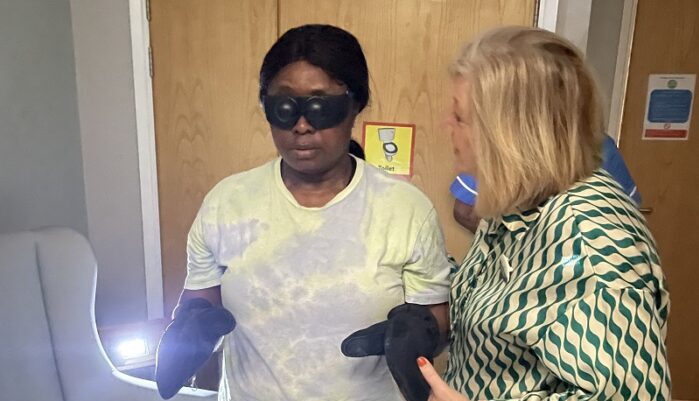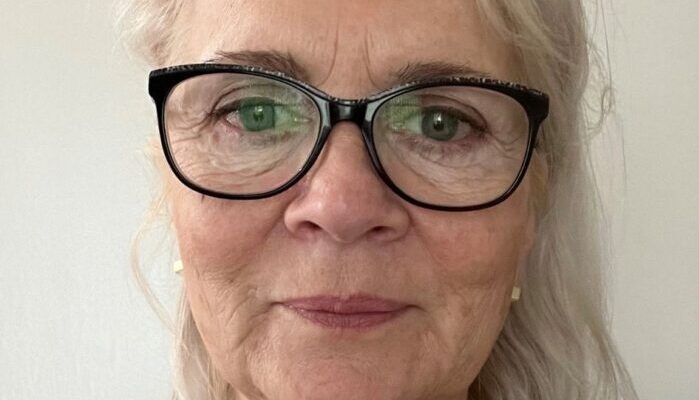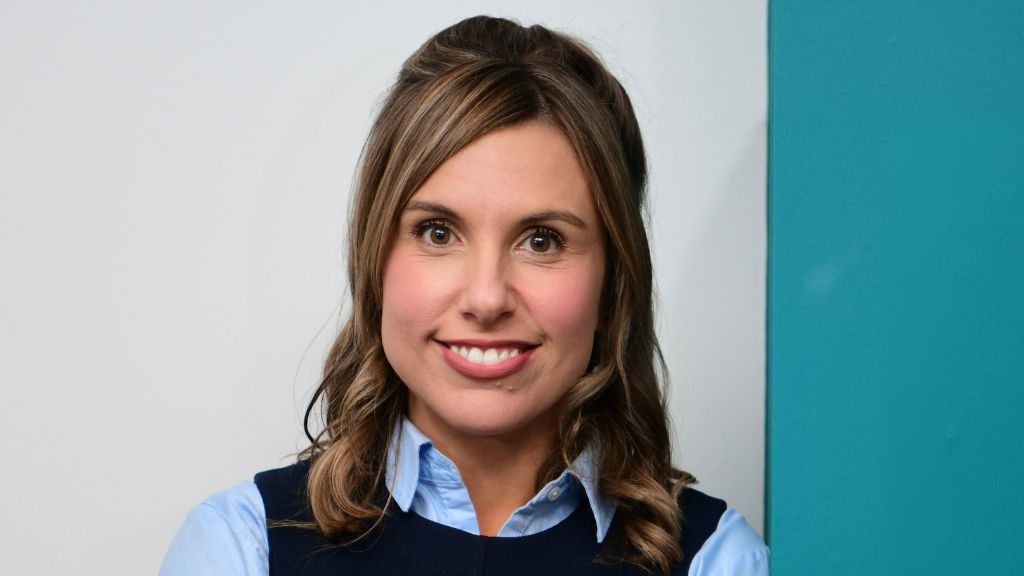The power of empowerment – how to inspire the best in your team through positive leadership
Caring Times editor Anna Dobbie joined Hallmark Care for the return of their legendary Leadership Empowerment training day, to observe how important a positive mental attitude is to the team’s well-being

Hallmark’s Leadership Empowerment seminar is held this year in a glorious country manor hotel near Dorking. I have never been to a motivational seminar, but I have heard rumours that brave attendees will be pushing their limits to walk barefoot over broken glass. When I’m presented with a matching t-shirt and greeted by clapping and dancing Hallmark employees, I’m briefly concerned that today may put the ‘cult’ into company culture.
However, it was hard not to be immediately won over by the positive way in which senior leadership interacted with their relaxed and happy staff, who were more than willing to get involved in the more extroverted aspects of the proceedings. It had been two years, four months and sixteen days since these people were last all in a room together and they seem delighted to be back. One home manager, who has been with Hallmark for 13 years (check out that staff retention), is keen for her new team to attend for the first time: “It’s so beautiful to see so many wonderful people and so many new faces. I want to empower my team to do what they don’t think they can do, but they are all capable. I see the potential in them”.
The day opened with a presentation by Hallmark’s founder and chief executive Avnish Goyal, who commented that the “energy today is awesome”, and I’m inclined to agree. Goyal defines empowerment as the process of becoming stronger and more confident, especially in controlling one’s life. After a five minute meditation, he discussed why the cabin crew encourage passengers to secure their own face mask first in an emergency: “How many times do you sacrifice yourself, your health and your state of mind for others? Today you are going to be selfish and think about what you want in life. If you put your own mask on first, you can help others better. Let’s invest in yourself.”
He referred to a janitor that President Kennedy once met when touring the NASA facilities, who, when asked what he did, said “I’m putting man on the moon”, and encourages his staff to think in this way when overcoming limiting beliefs. “Everyone here was chosen by others to be here,” he added.
Goyal then summarised his life story, to illustrate struggles he had overcome, such as bullying in school, and ways in which he had grown from his experiences, like working in his family’s newsagents, studying accounting and finance and setting up the Hallmark business.
Discussing recognising individuality, he stressed the importance of being as inclusive and open as possible, while listening, learning from mistakes and being honest with yourself. He also encouraged attendees to look past what they expect to see, as sometimes people can be so focussed on what is going on around them that they miss the bigger picture.
Just positive thinking?
After breaking for lunch, we were introduced to “the number one empowerment trainer for the care sector” Jermaine Harris, who opened by asking “how many have already thought that empowerment is just positive-thinking nonsense?”
Harris claims to have an “obsession with human mind and potential”; he has read over 400 books on the topic and has now written his own, called Rut Buster in partnership with the Hemraj Goyal Foundation.
He claims that he changed his life around after not one, but two severe injuries: “I started coming to sessions just like this one with the crazy person at the front! From there, I started and grew my business, met the woman of my dreams and became a father of two.”
He taps into an area of psychology which encourages people to revert to being a toddler again: “Toddlers don’t think ‘oh god, learn to walk, I’m not good enough, I don’t know if I can be bothered’ – they fall, they cry, they get back up and go again.”
Harris asked everyone in the room to jump up, smile and say “Yes” as loud as they can. “We all have different personality types, and some will be pushing themselves to stand up with a smile on their face but nothing that I ask you to do today will be anything like as challenging as the things life throws at you so push yourself.”
Sure enough, everyone jumped up. He explained that we were not born with a low level of enthusiasm and confidence, and if we practice something that doesn’t initially feel natural, like jumping up, it will start to become more comfortable and natural.
“No one has ever felt down, no one has ever felt depressed, no one has ever felt sad when shaking that ass,” he added while asking the audience to dance. “How would we feel if a pilot on a flight said, ‘we haven’t quite got enough fuel to get across Atlantic, but will give it a go?’”
Harris said we will come up against beliefs that will inevitably hold us back, but beliefs are not always truths, so he encourages negative beliefs to be questioned. He described how bringing up his three-year-old son, who has Cystic Fibrosis, has challenged his own negative beliefs, but when his son says “it’s okay daddy because I’m strong” it helps them both. “When you repeat ideas, that’s when the magic happens”.
He encouraged the audience to not think about being “happy when” but instead focus on being “happy now”, because, as his grandma said “every day above ground is a good day”. He also suggested a new way of setting goals, by considering “what do I want exactly, why do I want it, when exactly do I want it by and what must I do to get it?”
He said he believes in balance: “There is no positive without negative – so if this inner critic is a real thing, then there has to be a voice in our head like an inner coach”. He encouraged us to listen more to our inner coach before getting some of the audience on stage, to overcome their fears and walk barefoot on glass shards or smash through wooden blocks with their hands.
Routes of empowerment
But is empowerment one-size-fits-all? Gabriela Zackova, director of wellbeing and dementia at Loveday & Co has a different approach.
“I’m not one for group activities, I think it could make some people uncomfortable.” Having worked with the chain since shortly after the opening of their first home, Chelsea Court Place, Zackova has had an opportunity to get to know her colleagues, many of whom have also remained within the company.
“I think it’s just about accepting each other, understanding each other’s strengths and weaknesses,” she added, explaining that while some may be empowered by connecting over an evening out, others may prefer to be taken for a team lunch. “I want everyone to feel like there is leadership, but that it’s not above them, that it is accessible, and that they can call me anytime, text me, that we can go out if they prefer to have a chat outside the home. Getting to know team members and knowing what works for them; a bit like care, it’s personalised, as opposed to a one-size-fits-all approach.”
Zackova also tries to make staff feel valued and explore their future potential: “During our supervisions, I would say ‘I think you’re great at this, have you thought about a career in this?’ Then we started doing apprenticeships and putting people through courses and saw them blossom. It’s a home where people stay – they’re not looking for other jobs.
“The other brilliant thing is staff progression; it’s showing people that actually, they can have an amazing career. 70% of people that were with us when we first opened Chelsea Court Place have stayed, we have amazing retention. Some people started in reception and are now doing finance in the head office. Everyone is supported and given the training and tools to be the best versions of themselves and progress up the ladder.”
But what about those who are happy in their current role? “There are some people who don’t want to progress but then I say ‘Okay, but you’re great with new people who start and their induction, why won’t you be an induction champion, and when somebody new starts, we’ll have you welcome them to the home’. You give them responsibility and some reward and respect for their skills.”
Managing director of the Close care home Sanjay Dhrona echoes the importance of knowing your team is well trained.
“To empower your team, you need to have confidence in their ability to deliver your values in every element of your service, no matter what role they play in your organisation,” he said. “This comes down to your leadership and the skills and tools you provide them with to successfully achieve their goals daily.”
“Another key element is ensuring that your culture is focused on accepting responsibility rather than allocating blame. A productive culture sponsors an environment your team actively seek out opportunities to be creative and independent while being accountable for all traits of an empowered team.”
Psychologist Prof Tony Charlton describes the importance of rewarding good performance for staff empowerment and retention at Deerhurst, where his wife is a resident living with dementia: “The research literature on workplace effectiveness strongly encourages the notion that inspirational leadership helps instigate a positive ethos. The award of ‘most inspirational leader’ provided to Deerhurst manager Lesley Hobbs (at the National Care Awards in Brighton, 2016) casts further light on the reasons for the lack of agency staff at the home. Deerhurst has strong leadership with a candid focus on the person-centred care of residents and their families, as well as staff.”
HC-One also hold its own empowerment events, the last of which was in November 2021, and saw 400 home managers and support team members come together to share peer-to-peer learning, build a collective understanding of their plans for the future, and connect again, in person, after an incredibly challenging couple of years: “We all have the need to connect and belong, and these drivers help underpin our approach to delivering kind care, which can only be achieved through the dedication of our colleagues,” says John Handley, people director at HC-One.
He feels that an important part of empowering a team is to understand their lived experiences, continuously listen to their voice and provide the tools and information to deliver a great resident experience.
“We also currently run monthly ‘FUSE’ forums, which provide opportunities for colleagues to share their experiences, ask questions, and help us all improve our organisational working. To support this activity, we have recently invested in our new internal communications team, which is already identifying ways to simplify and broaden opportunities for all colleagues to share stories and updates, all of which are an important part of building a sense of community.”
Believe in the results
It was hard to deny the powerful feeling of positivity in the room after Hallmark’s empowerment day. Customer relationship manager at Regency House Sally Patterson had been before and felt that she had regained some of her confidence and positivity that was lost during lockdown: “I also understand the need to look after myself to enable me to give my best to others. It was great to spend the day feeling energised, focused and motivated to give my best to others, as well as to myself.
“I must have shown the fun I was having as Jermaine announced to the audience that I was enjoying the dancing way too much! The day also made me think about the journey that we are all on throughout life and how we could all learn to be more accepting of others’ needs.”
As for me, did I learn anything? Well, when AC/DC started playing, I hopped up on stage and (despite fears of breaking my wrist) I smiled, danced and smashed through a wooden board with my bare hand. So yes, I guess you could say I was empowered.



